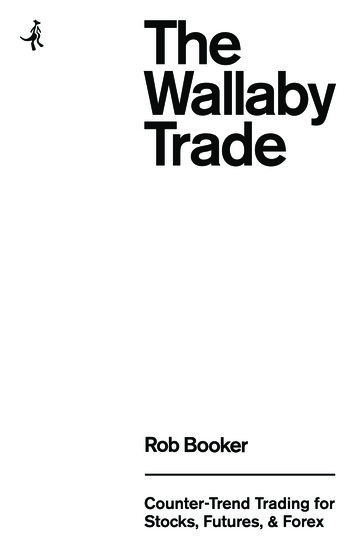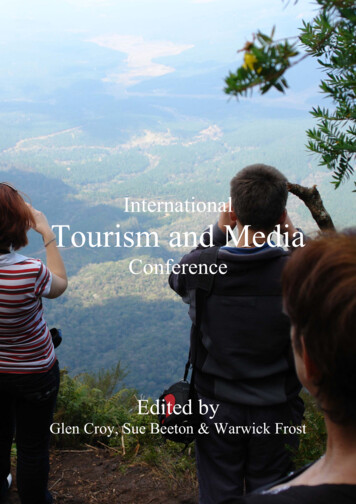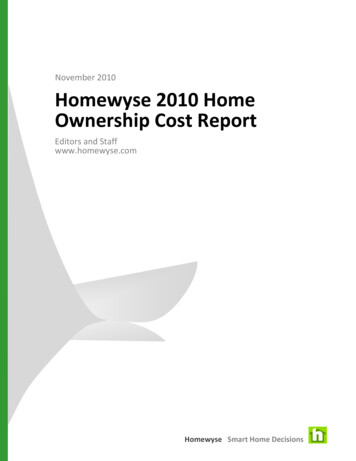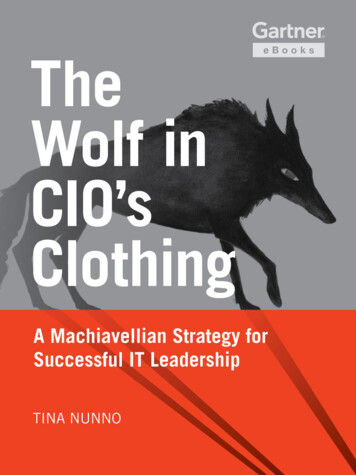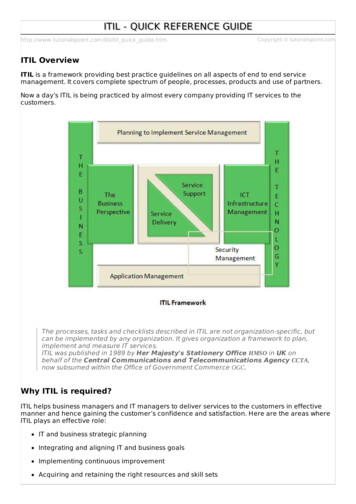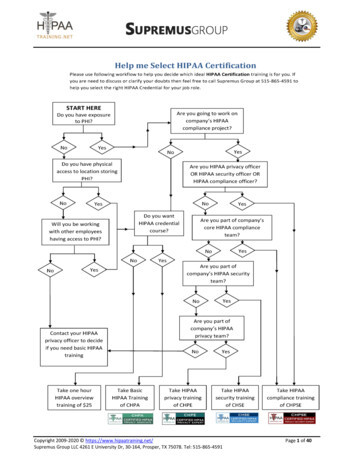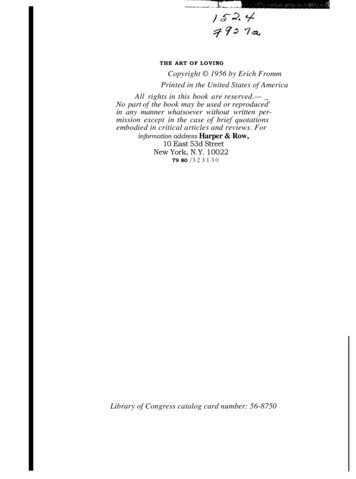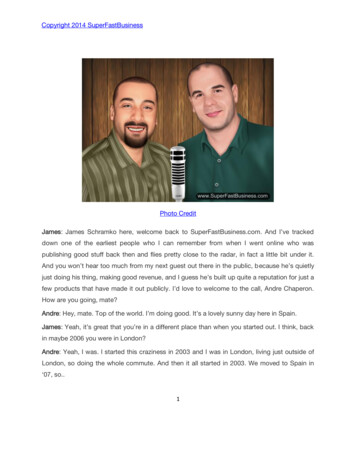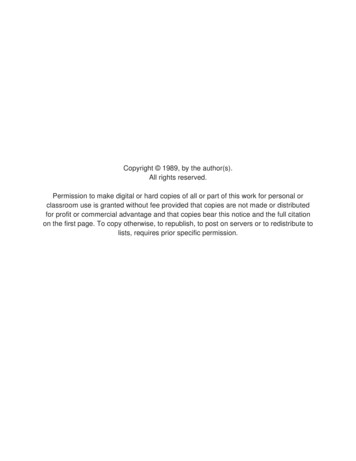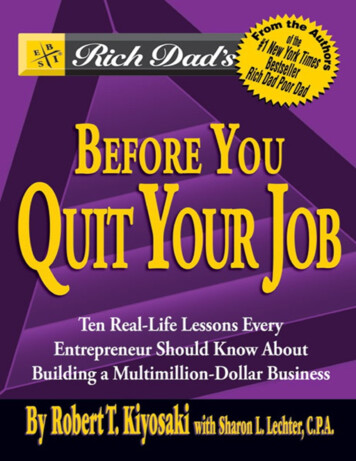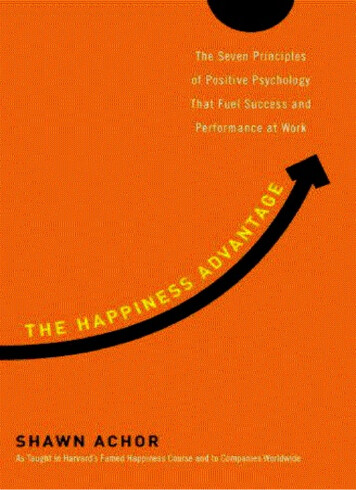
Transcription
Copyright 2010 by Shawn AchorAll rights reserved.Published in the United States by Crown Business, an imprint of the Crown PublishingGroup, a division of Random House, Inc., New York.www.crownpublishing.comCROWN BUSINESSand the Crown Business colophon are trademarks of Random House,Inc.Library of Congress Cataloging-in-Publication DataAchor, Shawn.The happiness advantage: the seven principles of positive psychology that fuel successand performance at work / Shawn Achor.—1st ed.1. Happiness—Psychological aspects. 2. Work—Psychological aspects. 3. Positivepsychology. I. Title.BF575.H27A27 2010158.7—dc222010006621eISBN: 978-0-307-59156-2v3.1
To my parents, both teachers, who have dedicated their lives to the belief that we can allshine brighter
ACKNOWLEDGMENTS
This section has been the most fun part of writing this book. I am humbled and excitedknowing that every word in this book has been shaped by the people in my life. I hope Ihave written in such a way that you can still hear their voices.Thank you to my mentor, Dr. Tal Ben-Shahar. I remember meeting him at a café inHarvard Square to discuss a new class on happiness. I found him to be a kind, mild, andunimposing man. Little did I know this humble stranger would soon transform Harvard,and my life in the process. It took him only one tall coffee to reorient my entire world,helping me see how my study of religious ethics at the divinity school paralleled thequestions asked in the science of positive psychology. He encouraged my growth andforgave my failings. Knowing him is one of my daily gratitudes; for without him, I wouldnot be in this field nor be writing this book today.Thank you to Elizabeth Peterson, one of my former students from the PositivePsychology class at Harvard, who later came to join my company. She, like Tal, is a loyalguardian of positive psychology, believing that it must not only remain a science, butmust also be lived. Liz has painstakingly edited every word of this book for a year, andhas in the midst of this challenge remained a true friend.Thank you to my mother, a high school English teacher and now college freshmenadvisor at Baylor University, and to my father, a professor of psychology also at Baylor,who gave me the twin gift of a love for learning and a love for teaching. I am grateful tomy sister, Amy, and brother, Bobo, who have kept the fires burning bright enough toremind me that I still had a home as I traveled nonstop for two years through fortycountries.Thank you to Mr. Hollis, who offered his genius as a public high school teacher; hemade me fall in love with academia. Thank you to Brian Little, who was the bestprofessor I had at Harvard and who I studied fervently as his Teaching Fellow, trying tolearn the art of lecturing from a master. Thank you to Professor Phil Stone for inspiringTal and me. Thank you to Professor Ellen Langer for letting me join her lab and to learnhow to think outside of the norms of what academia expects. Thank you to my literaryagent, Rafe Sagalyn, for making this book possible; Tal said he was the best and hewas right. Thank you to Roger Scholl at Broadway Books, who believed in this book, andto Talia Krohn at Broadway, who edited this book assiduously and with great insight.Thank you to the Young Presidents Organization for helping me meet so many newfriends all over the world from Asia to South America. Thank you to Salim Dewji forarranging my speaking tour through Africa, a lifelong dream. Thank you to MichelleBlieberg at UBS and Lisanne Biolos at KPMG for their friendship and for inviting me intotheir companies to test our theories. Thank you to John Galvin and Steven Schragis, whostarted my speaking career, propelling me out of the classroom and into the public withtalks at One Day University. Thank you to Michelle Lemmons, Greg Kaiser, and GregRay from International Speakers Bureau for partnering with me and for caring so muchfor building up their speakers. Thank you to my friends at the Washington SpeakersBureau and to C. J. Lonoff at Speaking Matters for helping bring this message
worldwide. Thank you to Carrie Callahan for her help with PR for me. And thank you toDini Coffin and Stewart Clifford from Enterprise Media for bringing this science to video.I have been blessed with a network of friends too large to name here, but a specialthank you to the following people whose friendship and encouragement have be integralto my happiness and success over the past year: Angie Koban, Alia Crum, Laura Babbittand Mike Lampert, Jessica Glazer, Max Weisbuch and Amanda Youmans, Judy andRuss Miller and Caroline Sami, Caleb Merkl, Olivia Shabb, and Brent Furl.If you have never written an acknowledgement page, try taking an afternoon to do it. Ihave just found that you cannot help but be happy and humbled being reminded that weare loved and that we do nothing alone.I look forward to the new friendships and community this book creates.
CONTENTS
COVERTITLE PAGECOPYRIGHTDEDICATIONACKNOWLEDGMENTSPART ONE: POSITIVE PSYCHOLOGY AT WORKINTRODUCTIONDISCOVERING THE HAPPINESS ADVANTAGETHE HAPPINESS ADVANTAGE AT WORKCHANGE IS POSSIBLEPART TWO: SEVEN PRINCIPLESPRINCIPLE #1: THE HAPPINESS ADVANTAGEPRINCIPLE #2: THE FULCRUM AND THE LEVERPRINCIPLE # 3 THE TETRIS EFFECTPRINCIPLE # 4: FALLING UPPRINCIPLE # 5: THE ZORRO CIRCLEPRINCIPLE # 6: THE 20-SECOND RULEPRINCIPLE #7: SOCIAL INVESTMENTPART THREE: THE RIPPLE EFFECTSPREADING THE HAPPINESS ADVANTAGE AT WORK, AT HOME, AND BEYONDNOTESABOUT THE AUTHOR
PART 1
POSITIVE PSYCHOLOGY AT WORK
INTRODUCTION
If you observe the people around you, you’ll find most individuals follow a formula thathas been subtly or not so subtly taught to them by their schools, their company, theirparents, or society. That is: If you work hard, you will become successful, and once youbecome successful, then you’ll be happy. This pattern of belief explains what most oftenmotivates us in life. We think: If I just get that raise, or hit that next sales target, I’ll behappy. If I can just get that next good grade, I’ll be happy. If I lose that five pounds, I’ll behappy. And so on. Success first, happiness second.The only problem is that this formula is broken.If success causes happiness, then every employee who gets a promotion, everystudent who receives an acceptance letter, everyone who has ever accomplished a goalof any kind should be happy. But with each victory, our goalposts of success keepgetting pushed further and further out, so that happiness gets pushed over the horizon.Even more important, the formula is broken because it is backward. More than adecade of groundbreaking research in the fields of positive psychology andneuroscience has proven in no uncertain terms that the relationship between successand happiness works the other way around. Thanks to this cutting-edge science, we nowknow that happiness is the precursor to success, not merely the result. And thathappiness and optimism actually fuel performance and achievement—giving us thecompetitive edge that I call the Happiness Advantage.Waiting to be happy limits our brain’s potential for success, whereas cultivatingpositive brains makes us more motivated, efficient, resilient, creative, and productive,which drives performance upward. This discovery has been confirmed by thousands ofscientific studies and in my own work and research on 1,600 Harvard students anddozens of Fortune 500 companies worldwide. In this book, you will learn not only why theHappiness Advantage is so powerful, but how you can use it on a daily basis to increaseyour success at work. But I’m getting excited and jumping ahead of myself. I begin thisbook where I began my research, at Harvard, where the Happiness Advantage wasborn.
DISCOVERING THE HAPPINESS ADVANTAGE
I applied to Harvard on a dare.I was raised in Waco, Texas, and never really expected to leave. Even as I wasapplying to Harvard, I was setting down roots and training to be a local volunteerfirefighter. For me, Harvard was a place from the movies, the place mothers joke abouttheir kids going to when they grow up. The chances of actually getting in wereinfinitesimally small. I told myself I’d be happy just to tell my kids someday, offhandedly atdinner, that I had even applied to Harvard. (I imagined my imaginary children being quiteimpressed.)When I unexpectedly got accepted, I felt thrilled and humbled by the privilege. I wantedto do the opportunity justice. So I went to Harvard, and I stayed for the next twelveyears.When I left Waco, I had been out of Texas four times and never out of the country(though Texans consider anything out of Texas foreign travel). But as soon as I steppedout of the T in Cambridge and into Harvard Yard, I fell in love. So after getting my BA, Ifound a way to stay. I went to grad school, taught sections in sixteen different courses,and then began delivering lectures. As I pursued my graduate studies, I also became aProctor, an officer of Harvard hired to live in residence with undergraduates to help themnavigate the difficult path to both academic success and happiness within the IvoryTower. This effectively meant that I lived in a college dorm for a total of 12 years of my life(not a fact I brought up on first dates).I tell you this for two reasons. First, because I saw Harvard as such a privilege, itfundamentally changed the way my brain processed my experience. I felt grateful forevery moment, even in the midst of stress, exams, and blizzards (something else I hadonly seen in the movies). Second, my 12 years teaching in the classrooms and living inthe dorms afforded me a comprehensive view of how thousands of other Harvardstudents advanced through the stresses and challenges of their college years. That’swhen I began noticing the patterns.
PARADISE LOST AND FOUNDAround the time that Harvard was founded, John Milton wrote in Paradise Lost, “TheMind is its own place, and in itself can make a heaven of hell, a hell of heaven.”Three hundred years later, I observed this principle come to life. Many of my studentssaw Harvard as a privilege, but others quickly lost sight of that reality and focused onlyon the workload, the competition, the stress. They fretted incessantly about their future,despite the fact that they were earning a degree that would open so many doors. Theyfelt overwhelmed by every small setback instead of energized by the possibilities in frontof them. And after watching enough of those students struggle to make their way through,something dawned on me. Not only were these students the ones who seemed mostsusceptible to stress and depression, they were the ones whose grades and academicperformance were suffering the most.Years later, in the fall of 2009, I was invited to go on a month-long speaking tourthroughout Africa. During the trip, a CEO from South Africa named Salim took me toSoweto, a township just outside of Johannesburg that many inspiring people, includingNelson Mandela and Archbishop Desmond Tutu, have called their home.We visited a school next to a shantytown where there was no electricity and scarcerunning water. Only when I was in front of the children did it dawn on me that none of thestories I normally use in my talks would work. Sharing the research and experiences ofprivileged American college students and wealthy, powerful business leaders seemedinappropriate. So I tried to open a dialogue. Struggling for points of commonexperience, I asked in a very clearly tongue-in-cheek tone, “Who here likes to doschoolwork?” I thought the seemingly universal distaste for schoolwork would bond ustogether. But to my shock, 95 percent of the children raised their hands and startedsmiling genuinely and enthusiastically.Afterward, I jokingly asked Salim why the children of Soweto were so weird. “They seeschoolwork as a privilege,” he replied, “one that many of their parents did not have.”When I returned to Harvard two weeks later, I saw students complaining about the verything the Soweto students saw as a privilege. I started to realize just how much ourinterpretation of reality changes our experience of that reality. The students who were sofocused on the stress and the pressure—the ones who saw learning as a chore—weremissing out on all the opportunities right in front of them. But those who saw attendingHarvard as a privilege seemed to shine even brighter. Almost unconsciously at first, andthen with ever-increasing interest, I became fascinated with what caused those highpotential individuals to develop a positive mindset to excel, especially in such acompetitive environment. And likewise, what caused those who succumbed to thepressure to fail—or stay stuck in a negative or neutral position.
RESEARCHING HAPPINESS AT HOGWARTSFor me, Harvard remains a magical place, even after twelve years. When I invite friendsfrom Texas to visit, they claim that eating in the freshman dining hall is like being atHogwarts, Harry Potter’s fantastical school of magic. Add in the other beautiful buildings,the university’s abundant resources, and the seemingly endless opportunities it offers,and my friends often end up asking, “Shawn, why would you waste your time studyinghappiness at Harvard? Seriously, what does a Harvard student possibly have to beunhappy about?”In Milton’s time, Harvard had a motto that reflected the school’s religious roots:Veritas, Christo et Ecclesiae (Truth, for Christ and the Church). For many years now, thatmotto has been truncated to a single word: Veritas, or just truth. There are now manytruths at Harvard, and one of them is that despite all its magnificent facilities, a wonderfulfaculty, and a student body made up of some of America’s (and the world’s) best andbrightest, it is home to many chronically unhappy young men and women. In 2004, forinstance, a Harvard Crimson poll found that as many as 4 in 5 Harvard students sufferfrom depression at least once during the school year, and nearly half of all
questions asked in the science of positive psychology. He encouraged my growth and forgave my failings. Knowing him is one of my daily gratitudes; for without him, I would not be in this field nor be writing this book today. Thank you to Elizabeth Peterson, one of my former students from the Positive Psychology class at Harvard, who later came to join my company. She, like Tal, is a loyal .
